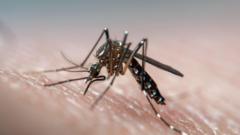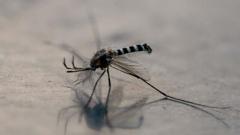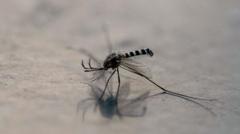In an unexpected twist on disease control, researchers have developed a technique to render male mosquitoes deaf, hindering their ability to mate and thus curbing the spread of ailments like dengue, yellow fever, and Zika. A study led by experts from the University of California, Irvine, focused on the Aedes aegypti species of mosquitoes known for infecting approximately 400 million individuals globally each year.
**Innovative Strategy to Combat Dengue: Silencing Male Mosquitoes**

**Innovative Strategy to Combat Dengue: Silencing Male Mosquitoes**
Scientists explore genetic modification to stop male mosquitoes from mating, aiming to reduce disease transmission.
The study found that male mosquitoes rely heavily on their ability to hear the wingbeats of females, which lures them into mating. By altering a genetic pathway associated with their auditory functions, researchers made significant strides towards preventing mating altogether. Over a three-day period, male mosquitoes modified to be deaf exhibited an inability to mate with females, essentially falling silent in the presence of potential partners.
The genetic mutation disrupted the action of a protein crucial for auditory function, leading to deaf males that could not respond to the enticing sounds produced by females. The results were striking, with wild males successfully fertilizing nearly all females introduced into their environment, contrasting sharply with the silence of their genetically modified counterparts.
Published in the journal PNAS, the findings indicate that silencing male mosquitoes could represent a viable avenue for controlling populations and mitigating disease transmission. Dr. Joerg Albert, a leading authority on mosquito mating behavior from the University of Oldenburg, highlighted the study's groundbreaking implications for mosquito control strategies. He underscored the importance of sound in reproduction and noted that without the ability to hear, male mosquitoes might face extinction, potentially affecting the ecological balance.
Alternative strategies under investigation include the release of sterilized males into areas plagued by mosquito-borne diseases. Despite their notoriety, mosquitoes play a crucial role in various ecosystems, serving as food for numerous wildlife species and acting as important pollinators, complicating the management of their populations.
The genetic mutation disrupted the action of a protein crucial for auditory function, leading to deaf males that could not respond to the enticing sounds produced by females. The results were striking, with wild males successfully fertilizing nearly all females introduced into their environment, contrasting sharply with the silence of their genetically modified counterparts.
Published in the journal PNAS, the findings indicate that silencing male mosquitoes could represent a viable avenue for controlling populations and mitigating disease transmission. Dr. Joerg Albert, a leading authority on mosquito mating behavior from the University of Oldenburg, highlighted the study's groundbreaking implications for mosquito control strategies. He underscored the importance of sound in reproduction and noted that without the ability to hear, male mosquitoes might face extinction, potentially affecting the ecological balance.
Alternative strategies under investigation include the release of sterilized males into areas plagued by mosquito-borne diseases. Despite their notoriety, mosquitoes play a crucial role in various ecosystems, serving as food for numerous wildlife species and acting as important pollinators, complicating the management of their populations.







